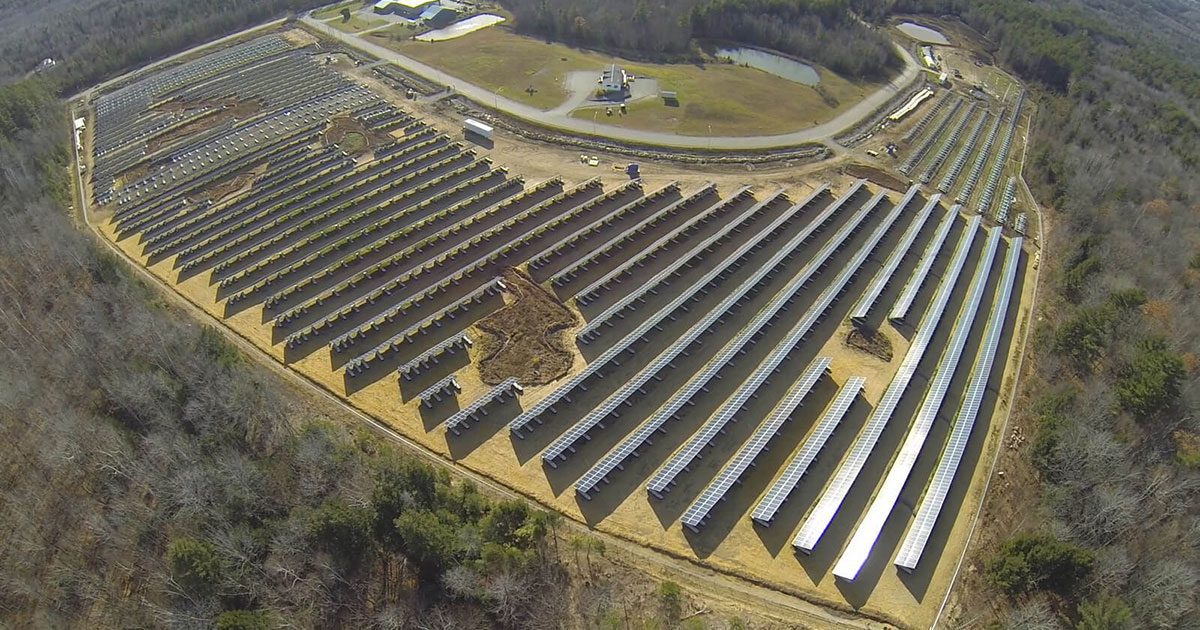As the coronavirus pandemic ripples across the world, the solar energy industry faces a threat in the shadows. The New England Ratepayers Association (NERA) recently introduced a petition to change the industry’s regulatory structures and reduce the amount of money solar users receive for the energy they produce but do not use.
NERA, a New Hampshire-based organization that has previously opposed clean-energy legislation in the Granite State, filed the petition with the Federal Energy Regulatory Commission on April 14. The pro-market association paid a $30,000 fee for the petition to be reviewed as a declaratory order, a legally binding classification that can reduce or eliminate litigation and speed up decision-making processes with less risk of agencies changing their decisions, adding to the concerns of solar stakeholders who fear being boxed out.
While opponents argue the petition would hinder renewable energy progress, proponents insist the petition would save ratepayers hundreds of millions of dollars.
The petition specifically aims to roll back net metering, which allows solar customers to use the energy their fixtures produce and receive credit for any extra energy they generate. In the alternative method — gross metering — utilities pay solar users a low credit for supplying solar energy to the electric grid, then charge them a higher rate — the same as what non-solar users pay — for any energy they consume. This can result in solar customers paying for electricity even if they use less than their panels produce.
The disappearance of net metering would send shocks through the solar industry as financial incentives are reduced and people are discouraged from buying into solar.
In Maine, where solar users get 100 percent credit for the extra energy they produce — compared to New Hampshire and Massachusetts, for instance, which credit consumers at a lower rate — losses would be felt particularly hard.
The petition also could lay the groundwork for the elimination of states’ ability to promote renewable energy policies that incentivize solar.
The Maine Office of the Public Advocate filed a motion opposing the petition and partnered with other states and Attorney General offices to extend the public comment period, which would have closed on May 14. After significant pressure, FERC extended the due date to June 15.
Andrew Landry, the deputy public advocate, called the petition a “double whammy” for policies attempting to lower greenhouse gas emissions and prices for ratepayers.
“The NERA petition is a dramatic overreach and an intrusion of state authority by federal authority,” added Jeffrey Genzer, lead counsel for the National Association of State Energy Officials (NASEO), which filed a motion to oppose the petition on May 4.

The administration of Gov. Janet Mills, a Democrat who signed a bill to end gross metering in 2019, also voiced concern.
“It would put into question some of the state’s new solar and distributed generation programs — that garnered bipartisan support and that are driving significant clean energy investments in Maine’s economy,” said Dan Burgess, director of Mills’ Energy Office, in an email to the Maine Monitor.
NERA President Marc Brown disagreed, stating he does not think the petition would hurt state-level renewable initiatives.
“This doesn’t prohibit states from implementing policies that will favor certain generation types — whether it be solar, wind, natural gas, nukes — whatever it might be,” said Brown.
Public service and utility companies from 19 states and the District of Columbia — representing 16 states and territories outside New England — and 11 Attorney General offices have filed motions to intervene as of May 18.
Harry Lanphear, administrative director for the Maine Public Utilities Commission, said on May 19 that while his regulatory agency is closely monitoring the petition and was among those that intervened, “we just haven’t formalized our legal position yet.”
Petition potential
If NERA’s petition prevails and significant changes to net metering are made, solar progress would likely slow down just when the industry started to ramp up, nationally and in Maine.
Opponents of the petition said it comes as state governments are overwhelmed with responding to the coronavirus.
With the renewable energy sector left out of federal coronavirus stimulus bills and no sign of tax credit or project timeline extensions being granted, the solar industry remains in limbo.

This flurry to get projects completed before deadlines creep up and tax credits drop has left the Maine solar industry, “hamstrung by COVID in a sense,” said Phil Coupe, co-founder and managing partner of ReVision Energy, an employee-owned solar company that operates out of Maine, New Hampshire and Massachusetts. ReVision had to furlough 60 of 260 employees as of May 19 and has halted all residential installations due to the coronavirus.
“The New England Ratepayers Association perceives a weak moment for the industry and they’re trying to attack us while we’re down on the ground,” said Coupe. “They’re also trying to do it under the cover of darkness during this COVID crisis.”
Jeremy Payne, executive director of Maine Renewable Energy Association, echoed that sentiment.
“There’s probably not a worse time to try and undercut an industry that is raising its hand and saying please let us invest somewhere and put people to work,” said Payne.
Asked why NERA filed the petition during the pandemic, Brown, its president, stated: “Well, FERC is conducting business now.”
NERA’s stance
NERA claims full net metering policies overpay solar consumers and transfer cost burdens to low and middle-income families who cannot afford to invest in solar and rely on public utilities for energy.

The association looks at rooftop solar as “leading to a ‘Reverse Robin Hood’ effect which has a disproportionately deleterious impact on the low-income and elderly communities and other citizens on fixed incomes,” according to an emailed press release NERA shared with the Maine Monitor.
While solar is the most expensive form of renewable energy, it is significantly cheaper than its coal-fired and oil-laden competitors, and the cost of installing solar has dropped over 70 percent in the last 10 years.
The average upfront cost of solar for a medium-sized home that generates electricity for 4 people is $18,500 when factoring in the federal tax credit, according to Coupe, of ReVision Energy. The payback typically takes 8 years.
NERA’s press release states that “because of net metering they (net metering customers) do not have to pay their fair share for the infrastructure which allows them to sell their product.”
Rep. Jeffery Hanley (R-Pittston), who voted against the 2019 bill that enabled net metering in Maine, agrees that crediting solar at a retail rate gives solar consumers too much back on their investment.

“They’re actually making money,” said Hanley, who was unaware of the NERA petition until the Maine Monitor reached out for comment.
“If you want all of the other citizens and ratepayers in the state of Maine to pay higher electric rates so you can have a solar panel array on your home or buildings, that to me is immoral.”
Utility companies make money as ratepayers buy into building and repairing infrastructure. But as net metering becomes more popular with the rise of solar, public utility companies lose money.
“This idea that residential solar is a ripoff to other consumers is a complete fantasy,” said Coupe.
While solar consumers pay upfront investment and sustained maintenance costs, they avoid the need to constantly tap into the utility-owned electrical grid. They also provide public health benefits to surrounding communities by not contributing to air pollution.
‘Dark money’
Solar advocates suspect politically charged money also backs the NERA petition. NERA is a registered social welfare organization — 501(c)(4) — which is basically, “a nonprofit that can lobby,” said Kenneth Colburn, who was an environmental regulator in New England for state and federal agencies for over 30 years.
We are always extraordinarily nervous about [groups like NERA] because they hide behind the latest campaign finance laws whereby they don’t have to disclose anything about any of their donations and who their supporters are.”
— Phil Coupe, co-founder of ReVision Energy
The political motives underlying social welfare organizations remain murky because these organizations don’t have to disclose their donors, and the contributions that donors make are not tax deductible. In contrast, 501(c)(3) organizations — often referred to as charitable organizations representing religious or educational purposes — have tax deductible writeoffs and cannot lobby.
“We are always extraordinarily nervous about these groups because they hide behind the latest, you know, campaign finance laws whereby they don’t have to disclose anything about any of their donations and who their supporters are,” said Coupe.
“We know — that in the background — they have enormous, deep-pocketed friends like the Koch brothers, who are filling the New England Ratepayers’ coffers with the cash that they need to go do what they’re doing in front of FERC right now.”
Coupe is not the only solar advocate skeptical of NERA’s financial backing.
“I think that some of that money is probably coming from utilities, but it’s dark money so we’ll never know,” says Rep. Seth Berry (D-Bowdoinham), who has advocated for clean energy and net metering programs since 2007.
Brown, NERA’s president, declined to speak about the organization’s connection to the Koch brothers and said NERA remains focused on pushing the petition forward despite backlash.
“This is a policy issue. This is a legal issue,” said Brown. “Who funds NERA is irrelevant.”
‘Bigger than … Citizens United’’
The nation’s solar industry employs over a quarter of a million people annually and nearly 800 people in Maine. This move could upend an industry on the rise as people back out of solar projects and job losses follow.

“Local job generation would lose. And on the other hand, big, big, centralized utilities and bigger, older, generation — dirtier generation — would clearly win,” said David Littell, a lawyer who focuses on energy and environment issues, and served as a Maine Public Utilities Commission (PUC) commissioner from 2010-15.
With over 25 years of regulatory and litigation experience, Littell has overseen thousands of energy efficiency cases. “It would be revolutionary,” said Littell. “It would be bigger than the impact of Citizens United was on campaign finance.”
Citizens United is the 2010 landmark Supreme Court case that ruled corporations are protected under the First Amendment right of free speech, giving way to the saying, “corporations are people.” Many argue this case allows for unlimited dark money to flood into politics as corporations and unions indiscriminately advocate for their interests with advertising campaigns.
What is net metering?
Net metering, the practice NERA seeks to end, is one of the major perks of investing in solar. It allows solar consumers to store loads of electricity year-round at the discretion of the sun and build credits for the clean energy they harness but don’t use.
Utility companies pay consumers back in full or partial credits — depending on the state — that compete with how much they would sell the energy for, which is known as the retail rate.
These programs give solar consumers a chance to break even or build excess credits on their energy bills while utility companies avoid having to generate that extra energy.
NERA’s petition would restructure how public utilities credit consumers.
Consumers would be paid back at a lower, wholesale rate instead of the retail rate.
Payne said this would harm the investments, commitments and contracts that solar developers, installers and consumers were promised when they invested in solar.
“They have made a bet based upon the rules of the road,” he said.
Green investments for rural Mainers
Residential solar is an increasingly popular option for Mainers in rural areas, where it can be hard to get reliable electricity. With solar energy cheaper than ever and the effects of climate change becoming increasingly severe, David Foley sees solar as an opportunity to put his money where his mouth is.
Foley is a green architect who powers his rural home with solar energy and reaps the benefits of net metering. “With a net metering policy in place — at the time we did this — I felt I had no risk at all,” said Foley.
Foley views his low risk and carbon-neutral investment as equal parts economical and ethical.
“It was a win-win for us; it was something that made financial sense and was very much in line with our beliefs,” he said.
Decarbonizing investments is a critical piece of solving the climate crisis on individual and international levels. Investing in clean and renewable energy — like solar — helps grow the economy while decreasing carbon footprints.
Building statewide energy resiliency is important in Maine as climate change intensifies already extreme temperature and precipitation patterns. The snowstorms and heat waves that roll across the state demand reliable energy to heat or cool homes.
For instance, Maine’s most recent mass power outage, during an April 9 snowstorm, left 250,000 people without power while cooped up at home because of stay-at-home orders related to the ongoing public health crisis.
During emergencies when energy is in peak demand, having extra energy on hand allows utility companies to disperse power while avoiding generating their own. Programs that incentivize renewables and reduce strain on the grid — like net metering — allow for citizens to lighten energy loads for utility companies when people need it most. This exchange all depends on people having the ability to generate extra energy and utility companies having the infrastructure to store the excess.
Not the first attack on net metering in Maine
The NERA petition comes as net metering was beginning to take off in Maine.

Before Gov. Paul LePage, a Republican, took office in 2011, people who adopted rooftop solar received an upfront $2,500 cash rebate for the installation.
While LePage was in office, “Maine did significantly roll back net metering,” said Berry. LePage chose Maine PUC appointees who equally frowned on net metering, and in February 2017 the LePage appointees ordered a net metering phase-out.
“In Maine, in the solar industry, we feel like we just recently survived former Governor LePage’s anti-solar, net metering attacks,” said Coupe, of ReVision Energy. Under LePage, net metering was slashed in favor or gross metering, which Coupe described as, “growing your own tomatoes at home, and then having to pay the grocery store for not buying them from the grocery store.”
Months after her 2019 inauguration, Mills signed legislation to restore net metering while putting incentives in place for solar. Mills has also taken strides toward combating climate change and expanding the state’s renewable energy portfolio.
As climate change continues to impact communities around the world, Berry sees the ability of Americans and Mainers to control their energy destiny as a way to build a cleaner climate future.
“We need to be smart about our energy choices and we need to increase — wherever we can — the ability of Mainers to control our own destiny. And solar is a way to do that,” said Berry.







